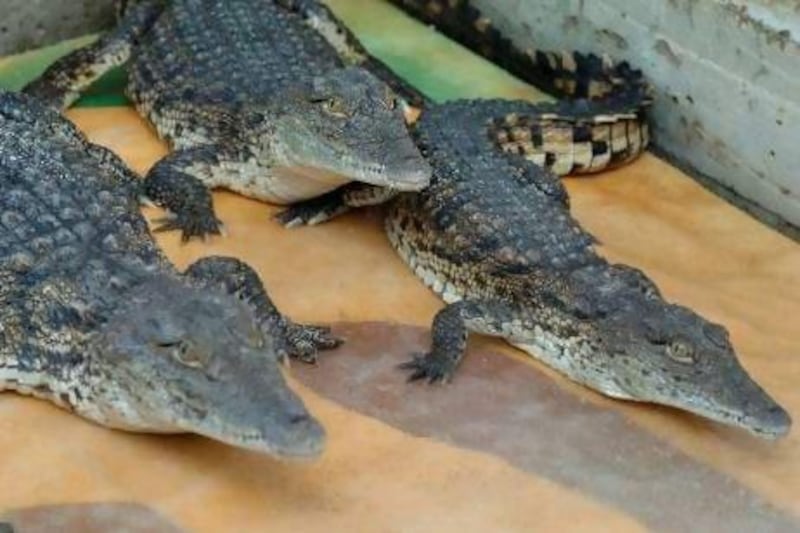DUBAI // One hundred crocodiles are to be given a new home in Dubai by the end of next year.
A 20,000 square-metre crocodile park is to be set up next door to Safari Dubai Experience, the emirate's new zoo in Al Warqa, at a cost of Dh36.7 million. The number of crocodiles in residence will make it the biggest park in the region, according to Dubai Municipality.
"At first we were concerned about whether the animals would be able to withstand the heat here," said Faisal Jumaa Al Badaiwi, head of the investment unit in Dubai Municipality's Assets Management Department, who is overseeing the park's creation. "But after doing some research we realised that not only can they cope but it also helps them to reproduce."
The park will not be part of the new Dubai zoo, but a nearby attraction. And the day to day operations of the park will be handled by a private company under the municipality's supervision.
"Our main goal is to make this an educational experience more than a theme park," said Mr Al Bawaidi. The park will have special pools where people can feed the crocodiles, as well as aquariums so you can see how they behave underwater.
"We will also have breeding areas and will be able to teach the public about reptile eggs and have them handle baby crocodiles, in addition to your usual gift shops and food and beverage areas."
Initial plans are to bring in two species of crocodile. "Most of them will be Nile Crocodiles, one of the largest species," said Mr Al Badaiwi. He was unable to name the second species.
"Our first priority was making sure we have the animals' well-being secured and that we have CITES approvals as well as other environmental and animal conservation approvals before undertaking this project," said Mr Al Badaiwi.
Animal expert and head of Dubai Zoo Dr Reza Khan, who is not involved in the project, said crocodiles would be relatively easy to care for in captivity.
"They are one of the sturdiest animals," he said. "Many species of crocodiles, including the Nile crocodile, live in semi desert conditions so they shouldn't have any problems here as long as there is ample water, vegetation and shaded areas."
While most crocodiles eat up to a kilogram of meat a day, large saltwater crocodiles and Nile crocodiles can consume more than five kilograms of meat a day, he said. "They don't really know when to stop eating - they have a bottomless appetite. Though they tend to eat less during winter and have a larger appetite during summer."
As with all animals, he added, babies will require special care to ensure their health and survival.
Mr Al Badaiwi said he expects the park to attract a large number of visitors.
"At the moment we get about 300,000 visitors to the Dubai Dolphinarium every year. I think this park will be more educational and more exciting, so I expect it will easily exceed that number."
The municipality is currently finalising the terms of the agreement with the investors and hopes to have the park open to the public by the end of 2013. The project will be jointly invested in by French and UAE parties, but will fall under the Dubai government umbrella.
The French partner in the project already runs three crocodile parks in France including La Ferme aux Crocodiles near Lyon, which is has over 400 crocodiles including some of the rarest species.
All the animals will be sourced from their parks in France and transported to Dubai when the facilities are ready, in about 10 months.
"Transportation is not a problem, they are very experienced with transporting these animals as they have already set up a park in Tunisia, so we don't expect to have any problems with that," said Mr Badaiwi.






